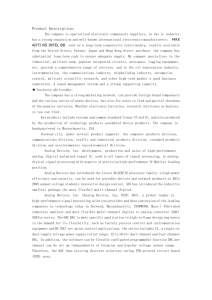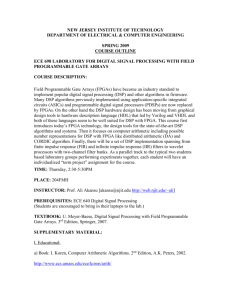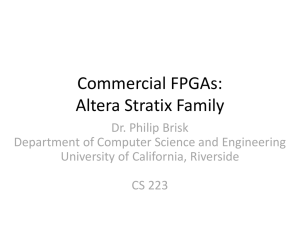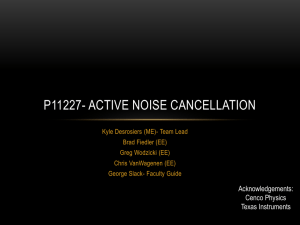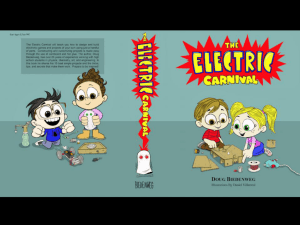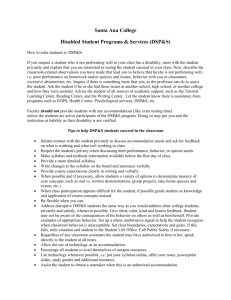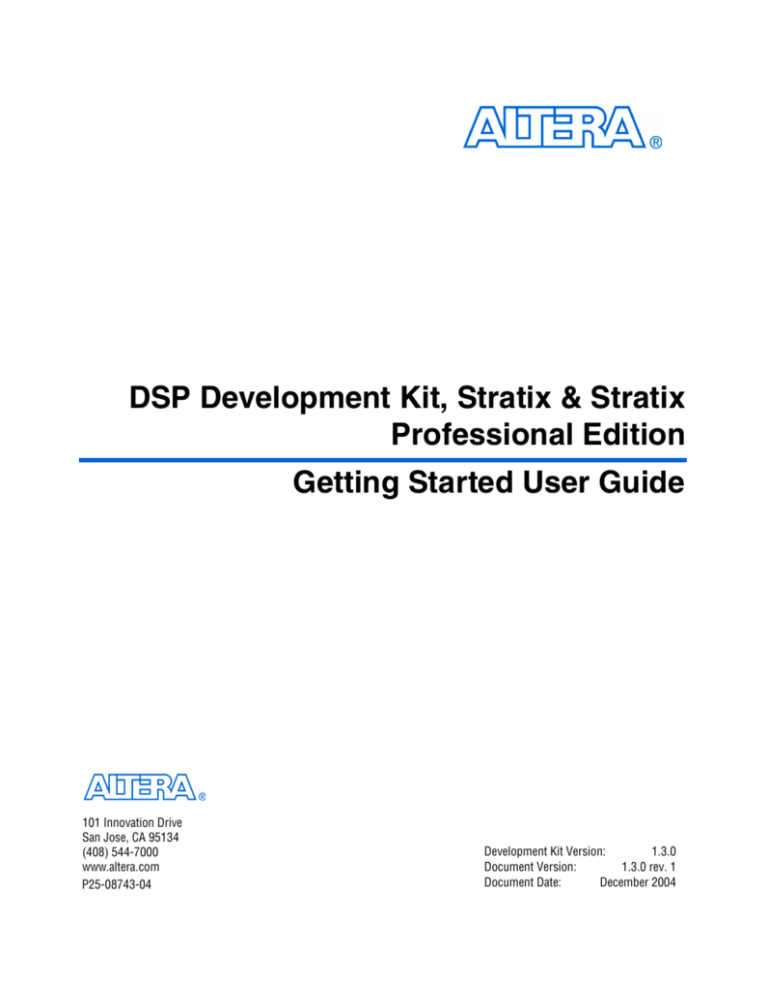
DSP Development Kit, Stratix & Stratix
Professional Edition
Getting Started User Guide
101 Innovation Drive
San Jose, CA 95134
(408) 544-7000
www.altera.com
P25-08743-04
Development Kit Version:
1.3.0
Document Version:
1.3.0 rev. 1
Document Date:
December 2004
Copyright © 2004 Altera Corporation. All rights reserved. Altera, The Programmable Solutions Company, the stylized Altera logo, specific device designations, and all other words and logos that are identified as trademarks and/or service marks are, unless noted otherwise, the trademarks and
service marks of Altera Corporation in the U.S. and other countries. All other product or service names are the property of their respective holders. Altera products are protected under numerous U.S. and foreign patents and pending applications, maskwork rights, and copyrights. Altera warrants
performance of its semiconductor products to current specifications in accordance with Altera's standard warranty, but reserves the right to make
changes to any products and services at any time without notice. Altera assumes no responsibility or liability arising out of the application or use of any information, product, or service described herein except as expressly agreed to in writing by Altera
Corporation. Altera customers are advised to obtain the latest version of device specifications before relying on any published information and before placing orders for products or services.
UG-STXDSPKIT-2.2
ii
Development Kit Version 1.3.0
Altera Corporation
DSP Development Kit, Stratix & Stratix Professional Edition Getting Started User GuidePreliminary
Contents
About This User Guide
Revision History ........................................................................................................................................ v
How to Contact Altera ............................................................................................................................ vi
Typographic Conventions ..................................................................................................................... vii
Chapter 1. About This Kit
Release Information ............................................................................................................................... 1–1
Introduction ............................................................................................................................................ 1–1
Kit Contents ............................................................................................................................................ 1–3
Chapter 2. Getting Started
Quartus II System Requirements ........................................................................................................ 2–1
Before You Begin ................................................................................................................................... 2–2
DSP Development Kit, Stratix Edition Contents ......................................................................... 2–2
DSP Development Kit, Stratix Professional Edition Contents ................................................... 2–2
Inspect the Board .............................................................................................................................. 2–3
Software Requirements ................................................................................................................... 2–3
Software Installation ............................................................................................................................. 2–4
Installing the Quartus II Software .................................................................................................. 2–4
Installing the MegaCore Functions & Reference Design ............................................................ 2–4
Installing The MathWorks MATLAB/Simulink CD-ROM ........................................................ 2–5
Installing DSP Builder ..................................................................................................................... 2–6
Set Up Licensing .................................................................................................................................... 2–8
Connect the Cables to the Board & PC ............................................................................................... 2–9
ByteBlasterMV Cable ....................................................................................................................... 2–9
RS-232 Cable .................................................................................................................................... 2–10
SMA Cable ....................................................................................................................................... 2–11
SLP-50 Anti-Aliasing Filter ........................................................................................................... 2–12
Power Supply Cable ....................................................................................................................... 2–12
Using the Reference Design ............................................................................................................... 2–12
Documentation ..................................................................................................................................... 2–13
Altera Corporation
Development Kit Version 1.3.0
iii
December 2004 DSP Development Kit, Stratix & Stratix Professional Edition Getting Started User Guide
Contents
iv
Development Kit Version 1.3.0
Altera Corporation
DSP Development Kit, Stratix & Stratix Professional Edition Getting Started User Guide December 2004
About This User Guide
Revision History
Chapter
Date
The table below displays the revision history for chapters in this user
guide.
Version
Changes Made
All
December 2004 1.3.0
rev. 1
Updated the document for:
● The DSP Development Kit, Stratix® Edition version 1.3.0.
● The DSP Development Kit, Stratix Professional Edition version 1.3.0.
● The Quartus II Software Development Kit Edition (DKE) version 4.2.
● The MathWorks MATLAB version 7.0.1.
● The MathWorks Simulink version 6.1.
All
April 2003
1.1.0
Updated the document for the DSP Development Kit, Stratix Professional
Edition.
All
February 2003
1.0.0
First publication.
f
For late-breaking information that is not available in this user guide, see
the README file. The file is located at:
■
For the DSP Development Kit, Stratix Edition Version 1.3.0 CD-ROM:
<install_ path>/stratix_dsp_kit-v<version>/Docs/
dsp_dev_kit_stratix_readme-v<version>.txt
or
■
For the DSP Development Kit, Stratix Professional Edition Version 1.3.0
CD-ROM:
<install_ path>/stratix_dsp_pro_kit-v<version>/
/Docs/dsp_pro_dev_kit_stratix_readme-v<version>.txt
Altera Corporation
Development Kit Version 1.3.0
v
December 2004 DSP Development Kit, Stratix & Stratix Professional Edition Getting Started User Guide
How to Contact Altera
How to Contact
Altera
Information Type
Technical support
For technical support or other information about Altera products, go to
the Altera world-wide web site at www.altera.com. You can also contact
Altera through your local sales representative or any of the sources listed
below.
USA & Canada
All Other Locations
www.altera.com/mysupport/
www.altera.com/mysupport/
800-800-EPLD (3753)
7:00 a.m. to 5:00 p.m. Pacific Time
+1 408-544-8767
7:00 a.m. to 5:00 p.m. (GMT -8:00)
Pacific Time
Product literature
www.altera.com
www.altera.com
Altera literature services
lit_req@altera.com
lit_req@altera.com
Non-technical customer
service
800-767-3753
+ 1 408-544-7000
7:00 a.m. to 5:00 p.m. (GMT -8:00)
Pacific Time
FTP site
ftp.altera.com
ftp.altera.com
vi
Development Kit Version 1.3.0
Altera Corporation
DSP Development Kit, Stratix & Stratix Professional Edition Getting Started User Guide December 2004
About This User Guide
Typographic
Conventions
Visual Cue
This document uses the typographic conventions shown below.
Meaning
Bold Type with Initial
Capital Letters
Command names, dialog box titles, checkbox options, and dialog box options are
shown in bold, initial capital letters. Example: Save As dialog box.
bold type
External timing parameters, directory names, project names, disk drive names,
filenames, filename extensions, and software utility names are shown in bold
type. Examples: fMAX, \qdesigns directory, d: drive, chiptrip.gdf file.
Italic Type with Initial Capital
Letters
Document titles are shown in italic type with initial capital letters. Example: AN
75: High-Speed Board Design.
Italic type
Internal timing parameters and variables are shown in italic type.
Examples: tPIA, n + 1.
Variable names are enclosed in angle brackets (< >) and shown in italic type.
Example: <file name>, <project name>.pof file.
Initial Capital Letters
Keyboard keys and menu names are shown with initial capital letters. Examples:
Delete key, the Options menu.
“Subheading Title”
References to sections within a document and titles of on-line help topics are
shown in quotation marks. Example: “Typographic Conventions.”
Courier type
Signal and port names are shown in lowercase Courier type. Examples: data1,
tdi, input. Active-low signals are denoted by suffix n, e.g., resetn.
Anything that must be typed exactly as it appears is shown in Courier type. For
example: c:\qdesigns\tutorial\chiptrip.gdf. Also, sections of an
actual file, such as a Report File, references to parts of files (e.g., the AHDL
keyword SUBDESIGN), as well as logic function names (e.g., TRI) are shown in
Courier.
1., 2., 3., and
a., b., c., etc.
Numbered steps are used in a list of items when the sequence of the items is
important, such as the steps listed in a procedure.
■
Bullets are used in a list of items when the sequence of the items is not important.
●
•
v
The checkmark indicates a procedure that consists of one step only.
1
The hand points to information that requires special attention.
c
The caution indicates required information that needs special consideration and
understanding and should be read prior to starting or continuing with the
procedure or process.
w
The warning indicates information that should be read prior to starting or
continuing the procedure or processes
r
The angled arrow indicates you should press the Enter key.
f
The feet direct you to more information on a particular topic.
Altera Corporation
December 2004
Development Kit Version 1.3.0
vii
DSP Development Kit, Stratix & Stratix Professional Edition Getting Started
Typographic Conventions
viii
Development Kit Version 1.3.0
Altera Corporation
DSP Development Kit, Stratix & Stratix Professional Edition Getting Started User Guide December 2004
Chapter 1. About This Kit
Release
Information
Table 1–1 provides information about this release of the DSP Development
Kit, Stratix® Edition and the DSP Development Kit, Stratix Professional
Edition.
Table 1–1. DSP Stratix Development Kits Release Information
Item
Description
DSP Development Kit, Stratix Edition
Version
1.3.0
Release Date
December 2004
Ordering Code
DSP-BOARD/S25
DSP Development Kit, Stratix Professional Edition
Introduction
Version
1.3.0
Release Date
December 2004
Ordering Code
DSP-BOARD/S80
This user guide provides comprehensive information about the DSP
Development Kit, Stratix Edition and the DSP Development Kit, Stratix
Professional Edition.
The DSP Development Kit, Stratix Edition and the DSP Development Kit,
Stratix Professional Edition provide everything you need to develop
complete system-on-a-programmable-chip (SOPC) solutions. This
document describes how to install the software provided with the kits
and how to connect the cables to the Stratix EP1S25 DSP development
board and to the Stratix EP1S80 DSP development board.
Altera Corporation
December 2004
Development Kit Version 1.3.0
1–1
Preliminary
Introduction
Figure 1–1 shows the contents of the development kits.
Figure 1–1. Stratix DSP Development Kit Contents
1–2
Development Kit Version 1.3.0
Altera Corporation
DSP Development Kit, Stratix & Stratix Professional Edition Getting Started User Guide December 2004
About This Kit
Kit Contents
The Stratix DSP development kits include:
■
The Stratix EP1S25 DSP development board or the Stratix EP1S80
DSP development board—The Stratix EP1S25 development board
and the Stratix EP1S80 DSP development board are prototyping
platforms that provide system designers with a solution for DSP
designs. Key features of the boards include a Stratix EP1S25 or
EP1S80 device, high-speed analog-to-digital (A/D) and
digital-to-analog (D/A) converters, and connectors for Texas
Instruments and Analog Devices evaluation boards.
1
For more information, see the Stratix EP1S25 Development Board
Data Sheet or the Stratix EP1S80 Development Board Data Sheet.
These documents are located at:
●
For the DSP Development Kit, Stratix Edition Version 1.3.0
CD-ROM (Stratix EP1S25 Development Board Data Sheet):
<install_ path>/stratix_dsp_kit-v<version>/Docs/
or
●
For the DSP Development Kit, Stratix Professional Edition Version
1.3.0 CD-ROM (Stratix EP1S80 Development Board Data Sheet):
<install_ path>/stratix_dsp_pro_kit-v<version>/Docs/
Altera Corporation
December 2004
■
DSP Builder version 2.2.1 (DSP system-level design tool that
interfaces the Quartus® II software and the MATLAB/Simulink
software)—DSP system design in Altera® devices requires both
high-level algorithms and hardware description language (HDL)
development tools. Altera’s DSP Builder integrates these tools by
combining the algorithm development, simulation, and verification
capabilities of The MathWorks MATLAB/Simulink system-level
design tools with HDL synthesis, simulation, and Altera
development tools. DSP Builder shortens DSP design cycles by
helping you create the hardware representation of a DSP design in an
algorithm-friendly development environment. DSP Builder allows
system, algorithm, and hardware designers to share a common
development platform. See the DSP Builder User Guide for more
information.
■
Quartus II Software Development Kit Edition (DKE) version 4.2—
The Quartus II software development kit provides a comprehensive
environment for SOPC design. The Quartus II software integrates
into nearly any design environment, with interfaces to
industry-standard EDA tools.
Development Kit Version 1.3.0
1–3
DSP Development Kit, Stratix & Stratix Professional Edition Getting Started Guide
Kit Contents
1
■
The Quartus II DKE software license allows you to use the
product for 12 months. After 12 months, you must purchase
a renewal subscription to continue using the software. For
more information, see the Altera web site at
www.altera.com.
Evaluation MegaCore® IP Functions version 2004.12—This
CD-ROM contains Altera IP MegaCore functions, including DSP
MegaCore functions. You can evaluate the MegaCore functions
using the OpenCore® Plus feature, which allows you to:
●
●
●
●
Simulate the behavior of a MegaCore function within your
system
Verify the functionality of your design, as well as quickly and
easily evaluate its size and speed
Generate time-limited device programming files for designs
that include MegaCore functions
Program a device and verify your design in hardware
You only need to purchase a license for a MegaCore function when
you are completely satisfied with its functionality and performance,
and want to take your design to production.
1
■
The OpenCore Plus hardware evaluation feature is an
evaluation tool for prototyping only. You must purchase a
license to use an Altera IP function in production designs.
You can obtain a license to enable the OpenCore Plus
feature from the Altera web site at www.altera.com.
Reference Design—Altera provides a filtering reference design with
the DSP Development Kit, Stratix Edition and the DSP Development Kit,
Stratix Professional Edition to help you get started building
applications. See “Using the Reference Design” on page 2–12 for
more information on the reference design provided.
1–4
Development Kit Version 1.3.0
Altera Corporation
DSP Development Kit, Stratix & Stratix Professional Edition Getting Started User Guide December 2004
Chapter 2. Getting Started
Quartus II
System
Requirements
Your system must meet the following minimum requirements:
■
■
■
■
■
■
■
■
f
Altera Corporation
December 2004
Pentium II PC running at 400 MHz or faster with 512-MB system
memory (faster systems give better performance)
1.2 GB of available disk space on the drive or partition where you
install the Quartus® II software and an additional 5.2 MB on the drive
containing your system directory
Microsoft Windows NT version 4.0 (Service Pack 6 or later), 2000, or
XP
Microsoft Windows-compatible SVGA monitor
CD-ROM drive
Internet Explorer (IE) starting with version 5.0 is required to use the
Quartus II online Help system. If you have IE version 3.x, the
Quartus II software will run, but the online Help system will not
work
Internet access for online registration of the Quartus II software and
request license files. If you do not have Internet access, contact your
local Altera representative
System administrator privileges to install parts of the Quartus II
software on Windows NT or Windows 2000
For additional information on system requirements, see the Quartus II
System Requirements section in the Quartus II Design Software Installation
& Licensing for PCs manual, which is included with the development kit.
Development Kit Version 1.3.0
2–1
Preliminary
Before You Begin
Before You
Begin
Before using the kit or installing the software included in the kit, be sure
to check the contents of the kit and inspect the board to verify that you
received all of the items. If any of these items are missing, contact Altera
before you proceed.
DSP Development Kit, Stratix Edition Contents
The DSP Development Kit, Stratix® Edition contains the following items:
■
■
■
■
■
■
■
■
■
■
■
■
Stratix EP1S25 DSP development board with an EP1S25 device
DSP Development Kit, Stratix Edition Version 1.3.0 CD-ROM
DSP Builder Version 2.2.1 CD-ROM
The MathWorks MATLAB and Simulink CD-ROM Release 14 with
Service Pack 1 (R14SP1). Includes:
●
MATLAB version 7.0.1
●
Simulink version 6.1
Quartus II Software Development Kit Edition (DKE) version 4.2
CD-ROM
MegaCore® IP library version 2004.12 CD-ROM
Mini-Circuits SLP-50 anti-aliasing filter
ByteBlasterMV™ cable
Power cable and adapters for North America, Europe, United
Kingdom, and Japan
SMA cable
RS-232 cable
Filtering reference design
DSP Development Kit, Stratix Professional Edition Contents
The DSP Development Kit, Stratix Professional Edition contains the
following items:
■
■
■
■
■
■
■
■
■
Stratix EP1S80 DSP development board with an EP1S80 device
DSP Development Kit, Stratix Professional Edition Version 1.3.0
CD-ROM
DSP Builder Version 2.2.1 CD-ROM
The MathWorks MATLAB and Simulink CD-ROM Release 14 with
Service Pack 1 (R14SP1). Includes:
●
MATLAB version 7.0.1
●
Simulink version 6.1
Quartus II Software Development Kit Edition (DKE) version 4.2
CD-ROM
MegaCore IP library version 2004.12 CD-ROM
Mini-Circuits SLP-50 anti-aliasing filter
ByteBlasterMV cable
Power cable and adapters for North America, Europe, United
Kingdom, and Japan
2–2
Development Kit Version 1.3.0
Altera Corporation
DSP Development Kit, Stratix & Stratix Professional Edition Getting Started User Guide December 2004
Getting Started
■
■
■
SMA cable
RS-232 cable
Filtering reference design
Inspect the Board
Place the board on an anti-static surface and inspect it to ensure that it has
not been damaged during shipment. Verify that all components are on
the board and appear intact.
1
The Stratix EP1S25 DSP development board or the Stratix
EP1S80 DSP development board can be damaged without
proper anti-static handling.
1
For more information on the board components and their
locations on the development boards, see the Stratix EP1S25
Development Board Data Sheet or the Stratix EP1S80 Development
Board Data Sheet. These documents are located at:
●
For the DSP Development Kit, Stratix Edition Version 1.3.0
CD-ROM (Stratix EP1S25 Development Board Data Sheet):
<install_ path>/stratix_dsp_kit-v<version>/Docs/
or
●
For the DSP Development Kit, Stratix Professional Edition Version
1.3.0 CD-ROM (Stratix EP1S80 Development Board Data Sheet):
<install_ path>/stratix_dsp_pro_kit-v<version>/Docs/
Software Requirements
You should install the following software before you begin developing
designs for the kit:
Altera Corporation
December 2004
■
The Quartus II software starting with version 4.2. See “Installing the
Quartus II Software” on page 2–4.
■
The software on the DSP Development Kit, Stratix Edition Version 1.3.0
CD-ROM or the DSP Development Kit, Stratix Professional Edition
Version 1.3.0 CD-ROM. See “Installing the MegaCore Functions &
Reference Design” on page 2–4.
Development Kit Version 1.3.0
2–3
DSP Development Kit, Stratix & Stratix Professional Edition Getting Started Guide
Software Installation
■
The following software is required to create hardware description
language (HDL) designs that use blocks from DSP Builder:
●
●
MATLAB version 7.0.1
Simulink version 6.1
DSP Builder provides automated flows using Tcl scripts as well as a
manual flow (see the DSP Builder User Guide for a description of these
flows). In addition to Quartus II integrated synthesis, the automated
flow also supports Mentor Graphics® ModelSim®-Altera, ModelSim
PE, or ModelSim SE version 5.8d.
■
You need your network identification card (NIC) for licensing the
Quartus II software.
1
Software
Installation
Your NIC ID is a 12-digit hexadecimal number that
identifies the Windows NT workstation that serves
Quartus II licenses. Networked (or floating node) licensing
requires a NIC ID or server host ID. When obtaining a
license file for network licensing, you should use the NIC
ID from the PC that will issue the Quartus II licenses to
distributed users over a network. You can find the NIC ID
for your card by typing ipconfig /all at a command
prompt. Your NIC ID is the number on the physical address
line, without the dashes.
This section explains how to install the following software:
■
■
■
■
“Installing the Quartus II Software”
“Installing the MegaCore Functions & Reference Design”
“Installing The MathWorks MATLAB/Simulink CD-ROM”
“Installing DSP Builder”
Installing the Quartus II Software
Software installation directions are provided in the Installing the Quartus
II Software section in the Quartus II Design Software Installation & Licensing
for PCs manual, which is included with the development kit. After
installing the software, you must request and install a license to enable it.
See “Set Up Licensing” on page 2–8 for more information.
Installing the MegaCore Functions & Reference Design
To install the MegaCore functions and reference design, insert the
MegaCore IP library version 2004.12 CD-ROM into your CD-ROM drive.
The installation program runs automatically.
2–4
Development Kit Version 1.3.0
Altera Corporation
DSP Development Kit, Stratix & Stratix Professional Edition Getting Started User Guide December 2004
Getting Started
You only need to purchase a license for a MegaCore Plus function when
you are completely satisfied with its functionality and performance, and
want to take your design to production.
1
The OpenCore Plus hardware evaluation feature is an
evaluation tool for prototyping only. You must purchase a
license to use an Altera IP Megafunction in production designs.
Figure 2–1 shows the Stratix DSP development kit directory structure.
Figure 2–1. Stratix DSP Development Kit Directory Structure
<install-path>stratix_dsp_kit-v<version> or <path>stratix_dsp_pro_kit-v<version>
The stratix_dsp_kit-v<version> directory contains the files for the Stratix EP1S25 DSP
development board. The stratix_dsp_pro_kit-v<version> directory contains the files for
the Stratix EP1S80 DSP development board.
Docs
Contains schematics, data sheet, and readme file for the DSP Development Kit,
Stratix Edition or the DSP Development Kit, Stratix Professional Edition.
Reference_Design
Contains reference design for the DSP Development Kit, Stratix Edition or
the DSP Development Kit, Stratix Professional Edition.
Filtering
Contains the filtering reference design file and documentation.
Doc
Contains the filtering Application Note.
Exercises1and2and3
Contains exercises 1, 2, and 3.
Exercise4
Contains exercise 4.
Installing The MathWorks MATLAB/Simulink CD-ROM
To install The MathWorks software, perform the following steps:
1.
Before installing, make sure that you have your Personal License
Password (PLP) available.
1
Altera Corporation
December 2004
A 30-day license for MATLAB/Simulink is included as part
of the DSP Development Kit, Stratix Edition and the DSP
Development Kit, Stratix Professional Edition. To obtain the
PLP and for more information, visit The MathWorks at:
www.mathworks.com/products/connections/trials
/altera.shtml.
Development Kit Version 1.3.0
2–5
DSP Development Kit, Stratix & Stratix Professional Edition Getting Started Guide
Software Installation
2.
If you have installed a previous version of the MATLAB/Simulink
software, and it is running, close the software before continuing to
the next step.
3.
Insert the The MathWorks MATLAB and Simulink CD-ROM Release 14
with Service Pack 1 (R14SP1). The MathWorks Installer automatically
starts, displaying the Welcome to the MathWorks Installer dialog
box. Choose Install and click Next.
4.
Enter your name, company name, and PLP in the License
Information dialog box and click Next.
5.
Review the software licensing agreement and, if you agree with the
terms, select the Yes check box and click Next.
6.
Select Typical or Custom installation and click Next.
7.
Click Install.
8.
Click Finish.
Installing DSP Builder
To install DSP Builder, perform the following steps.
1
1.
Before you install DSP Builder, Altera recommends that you
install the MATLAB and Simulink software and the Quartus II
software.
Close the following software applications if they are open:
●
●
●
●
●
●
The Quartus II software
The MAX+PLUS® II software
The Mentor Graphics® LeonardoSpectrum™ synthesis tool
The Synplicity Synplify Pro software
The MATLAB and Simulink software (if you have installed
previous versions)
The ModelSim-Altera, ModelSim PE, or ModelSim SE simulator
software
2.
Choose Run (Windows Start menu).
3.
Insert the DSP Builder Version 2.2.1 CD-ROM into your CD-ROM
drive. Type <drive letter>:\dspbuilder-v2.2.1.exe, where
<drive letter> is your CD-ROM drive.
2–6
Development Kit Version 1.3.0
Altera Corporation
DSP Development Kit, Stratix & Stratix Professional Edition Getting Started User Guide December 2004
Getting Started
4.
f
Click OK. The DSPBuilder v2.2.1 - InstallShield Wizard dialog box
appears. Follow the on-line instructions to finish installation.
1
The DSP Builder software license included with the DSP
Development Kit, Stratix Edition and the DSP Development Kit,
Stratix Professional Edition is a perpetual license with free
software upgrades for the first 12 months. After 12 months, you
must purchase a renewal subscription for access to future
software upgrades. For more information, refer to the Altera
web site at www.altera.com.
1
DSP Builder launches the LeonardoSpectrum, Synplify Pro, or
Quartus II software by retrieving the software’s path
information from your PC’s registry file. If you have installed
multiple versions of these software products, the registry may
not point to the version you want to use with DSP Builder. In
DSP Builder you can specify a path to use other than the registry
setting for each of the tools.
For information on specifying the paths, see the Specifying Precision RTL
Synthesis, LeonardoSpectrum, Synplify & Quartus II Path Information for
SignalCompiler section in the Troubleshooting chapter in the DSP Builder
User Guide.
When you have finished installing DSP Builder, view DSP Builder
libraries in the MATLAB software by performing the remaining steps.
5.
Start the MATLAB software.
6.
At the MATLAB command prompt, change directory to the DSP
Builder\altlib directory and type the following:
setup_dspbuilder r
f
Altera Corporation
December 2004
7.
Expand the Simulink icon in the Launch Pad window.
8.
Double-click the Library Browser icon. The Altera DSP Builder
folder appears in the Simulink Library Browser window.
For information on the DSP Builder directory structure, see the DSP
Builder User Guide. The DSP Builder User Guide also includes a tutorial
that describes how to create a design in Simulink and then convert it to
VHDL for synthesis, Quartus II compilation, and RTL simulation.
Development Kit Version 1.3.0
2–7
DSP Development Kit, Stratix & Stratix Professional Edition Getting Started Guide
Set Up Licensing
Set Up Licensing
Before using the Quartus II software and DSP Builder, you must request
a license file from the Altera web site. Select the Licensing link at
www.altera.com. Install the license file on your PC. When you request a
license file, Altera e-mails you a license.dat file that enables the software.
To obtain a license, perform the following steps:
1.
Select the Licensing link at www.altera.com.
2.
Click DSP Development Kit, Stratix Edition or DSP Development
Kit, Stratix Professional Edition.
3.
Follow the online instructions to request your license. A license.dat
file is e-mailed to you.
4.
Close the following software applications if they are open:
●
●
●
●
●
●
1
The Quartus II software
The MAX+PLUS II software
The MATLAB and Simulink software
The LeonardoSpectrum synthesis tool
The Synplicity Synplify Pro software
The ModelSim simulator
To install your license, see the Specifying the License File section
in the Quartus II Design Software Installation & Licensing for PCs
manual, which is included with the development kit.
2–8
Development Kit Version 1.3.0
Altera Corporation
DSP Development Kit, Stratix & Stratix Professional Edition Getting Started User Guide December 2004
Getting Started
Connect the
Cables to the
Board & PC
The instructions in this section explain how to set up the following
hardware:
■
■
■
■
■
ByteBlasterMV cable
RS-232 cable
Power supply cable
SMA cable
SLP-50 anti-aliasing filter
1
Before connecting the cables, disconnect the power supply cable
from your board.
ByteBlasterMV Cable
The board supplies power to the ByteBlasterMV download cable.
Connect the ByteBlasterMV cable’s 10-pin female plug to the Stratix
device JTAG header on the board (JP30 for the board with the EP1S80
device and JP17 for the board with the EP1S25 device) and connect the
other end to your PC to configure the Stratix device directly using an
SRAM Object File (.sof). See Figure 2–2. The reference design provided in
the development kits include an SOF for configuring the Stratix device
directly.
1
Align the ByteBlasterMV connector so that the red stripe is
oriented towards the Altera logo on the board.
1
For more information on how to configure the Stratix device on
the development board see the Stratix EP1S25 DSP Development
Board Data Sheet or Stratix EP1S80 DSP Development Board Data
Sheet. These documents are located at:
●
For the DSP Development Kit, Stratix Edition Version 1.3.0
CD-ROM (Stratix EP1S25 Development Board Data Sheet):
<install_ path>/stratix_dsp_kit-v<version>/Docs/
or
●
For the DSP Development Kit, Stratix Professional Edition Version
1.3.0 CD-ROM (Stratix EP1S80 Development Board Data Sheet):
<install_ path>/stratix_dsp_pro_kit-v<version>/Docs/
f
Altera Corporation
December 2004
For more information on configuring Stratix devices, see the Configuring
Stratix & Stratix GX Devices chapter in the Stratix Device Handbook,
Volume 2.
Development Kit Version 1.3.0
2–9
DSP Development Kit, Stratix & Stratix Professional Edition Getting Started Guide
Connect the Cables to the Board & PC
Figure 2–2. Connect the ByteBlasterMV Cable to the EP1S25 or EP1S80 Board
RS-232 Cable
You can optionally attach the serial cable to one of the serial ports on your
PC and to the RS-232 male connector at J8 on the board. See Figure 2–3.
1
For the Stratix DSP board to communicate with the PC via the
RS-232 cable, RS-232 interface logic must be implemented in the
Altera device on the board.
For the EP1S25 development board, the J8 connector is located
on the bottom, right-hand side of the board. For the EP1S80
development board, the J8 connector is located on the bottom,
left-hand side of the board.
2–10
Development Kit Version 1.3.0
Altera Corporation
DSP Development Kit, Stratix & Stratix Professional Edition Getting Started User Guide December 2004
Getting Started
Figure 2–3. Connect the RS-232 Cable to the EP1S25 Development Board
SMA Cable
For the Stratix EP1S25 development board or the Stratix EP1S80
development board, connect both ends of the SMA cable to the board.
This cable connects the digital-to-analog (D/A1 or D/A2) and
analog-to-digital (A/D1 or A/D2) connectors on the board. See
Figure 2–4.
Figure 2–4. Connect the SMA Cable to the EP1S25 Development Board
SMA Cables
Power Cable
Altera Corporation
December 2004
Development Kit Version 1.3.0
2–11
DSP Development Kit, Stratix & Stratix Professional Edition Getting Started Guide
Using the Reference Design
SLP-50 Anti-Aliasing Filter
The SLP-50 anti-aliasing filter from Mini-Circuits provides a 55-MHz
cut-off frequency. To use the anti-aliasing filter, connect one end of the
filter to one of the digital-to analog connectors on the Stratix EP1S25
development board or the Stratix EP1S80 development board (D/A1 or
D/A2). Connect the other end of the filter to the SMA cable. You can
perform an external loopback from the D/A converter to one of the A/D
converters by connecting the other end of the SMA cable to one of the
A/D connectors on the board (A/D1 or A/D2).
Power Supply Cable
Connect the power cable to the Stratix EP1S25 development board or the
Stratix EP1S80 development board 5.0-V Power Supply Connector (J1)
and plug the other end into a power outlet. Figure 2–4 illustrates this for
the Stratix EP1S25 development board.
After the board powers up, the on-board flash, which is shipped
pre-programmed with a filtering design, automatically configures the
Stratix device. The conf_done LED (D5) turns on, signifying that the
Stratix device is configured.
Using the
Reference
Design
Altera provides a filtering reference design with the DSP Development Kit,
Stratix Edition and the DSP Development Kit, Stratix Professional Edition to
help you get started building applications.
DSP Filtering Reference Design—The DSP Development Kit, Stratix
Edition and the DSP Development Kit, Stratix Professional Edition filtering
reference design shows you how to use DSP Builder for system design,
simulation, and board-level verification. DSP Builder is a digital signal
processing development tool that interfaces The MathWorks
industry-leading system-level DSP tool Simulink with the Quartus II
software. DSP Builder provides a seamless design flow in which you can
perform algorithmic design and system integration in the MATLAB and
Simulink software and then port the design to HDL files for use in the
Quartus II software.
2–12
Development Kit Version 1.3.0
Altera Corporation
DSP Development Kit, Stratix & Stratix Professional Edition Getting Started User Guide December 2004
Getting Started
Documentation
The DSP Development Kit, Stratix Edition Version 1.3.0 CD-ROM contains
the following documentation:
■
■
■
■
1
DSP Development Kit, Stratix & Stratix Professional Edition Getting
Started User Guide (this document)
Stratix EP1S25 DSP Development Board Data Sheet
AN 245: Stratix Filtering Reference Design
Stratix EP1S25 DSP Development Board Schematics
A printed copy of the Quartus II Design Software Installation and
Licensing for PCs manual is included in the development kit,
however; it is not included on the CD-ROM.
The DSP Development Kit, Stratix Professional Edition Version 1.3.0
CD-ROM contains the following documentation:
■
■
■
■
1
Altera Corporation
December 2004
DSP Development Kit, Stratix & Stratix Professional Edition Getting
Started User Guide (this document)
Stratix EP1S80 DSP Development Board Data Sheet
AN 245: Stratix Filtering Reference Design
Stratix EP1S80 DSP Development Board Schematics
A printed copy of the Quartus II Design Software Installation and
Licensing for PCs manual is included in thedevelopment kit,
however; it is not included on the CD-ROM.
Development Kit Version 1.3.0
2–13
DSP Development Kit, Stratix & Stratix Professional Edition Getting Started Guide
Documentation
2–14
Development Kit Version 1.3.0
Altera Corporation
DSP Development Kit, Stratix & Stratix Professional Edition Getting Started User Guide December 2004

